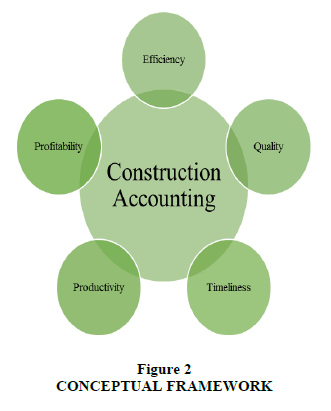Top Construction Accounting Tips for Ensuring Financial Success in Your Projects
Top Construction Accounting Tips for Ensuring Financial Success in Your Projects
Blog Article
Recognizing the Significance of Building Accountancy for Successful Project Management

Role of Construction Accountancy
Building and construction bookkeeping offers as the backbone of monetary management in the construction sector, making sure that jobs are completed within budget plan and monetary purposes are fulfilled. construction accounting. This specific accountancy method addresses the special challenges faced in building and construction tasks, consisting of differing job periods, varying expenses, and several stakeholders
Among the primary roles of building and construction bookkeeping is to give precise expense evaluation and tracking throughout the project lifecycle. This promotes enlightened decision-making, making it possible for task managers to change resources and timelines effectively. Furthermore, building and construction accountancy enhances cash money flow monitoring by keeping track of accounts receivable and payable, thus making certain that funds are offered for timely repayments to distributors and subcontractors.
Moreover, building accountancy aids in conformity with market guidelines and coverage requirements. It furnishes task managers with the needed economic data to prepare thorough monetary statements, which are essential for audits and economic evaluations. By keeping clear records, building and construction accountancy cultivates transparency and accountability, crucial components in building depend on among stakeholders. Ultimately, the function of building and construction accountancy prolongs beyond plain monetary monitoring; it is essential to calculated preparation and functional efficiency, driving the success of building and construction projects in a competitive landscape.
Trick Components of Building Bookkeeping

Budgeting establishes a monetary framework that guides job implementation, permitting managers to designate sources efficiently and expect possible monetary challenges. Accurate cost monitoring is necessary for tracking expenses in real-time, aiding to determine differences between forecasted and real expenses. This allows prompt changes to keep the project on budget plan.
Additionally, economic reporting gives stakeholders with a clear image of the job's monetary health. Normal records, such as earnings and loss declarations and money flow analyses, facilitate informed decision-making and enhance openness among all celebrations entailed.
In addition, conformity with industry regulations and accounting criteria is critical. This makes certain that economic practices are not only efficient yet additionally legal, guarding the company versus lawful repercussions. By incorporating these key elements, building and construction accountancy fosters a structured method to managing funds, ultimately adding to the effective completion of construction tasks.
Benefits for Project Supervisors
Leveraging reliable construction accountancy techniques offers task supervisors with a multitude of benefits that enhance both functional effectiveness and monetary oversight. One significant benefit is improved budget administration. Precise monitoring of expenses and revenues enables task supervisors to check economic performance in genuine time, guaranteeing projects remain within budget plan and facilitating prompt changes when needed.
Furthermore, construction accountancy streamlines capital administration, allowing project managers to maximize and expect monetary needs resource allotment. By recognizing money inflows and outflows, they can much better handle payments to subcontractors, workers, and distributors, therefore staying clear of expensive hold-ups.
Furthermore, durable accounting systems offer comprehensive coverage abilities. Job managers can generate records that use insights into task profitability, cost differences, and source use. This data-driven article source method promotes informed decision-making, allowing supervisors to identify prospective problems proactively and execute corrective procedures.
Last but not least, adherence to building and construction audit criteria makes certain compliance with governing and lawful needs, lessening the threat of fines or disagreements. On the whole, reliable construction bookkeeping equips task supervisors with the devices needed to drive job success, enhance stakeholder confidence, and advertise long-term organizational growth.
Usual Challenges in Construction Accounting
Numerous job managers come across significant obstacles in construction accountancy that can prevent job success. Among the main difficulties is the complexity of tracking multiple job sites, each with unique spending plans, timelines, and source appropriations. This requires precise focus to detail, which can be frustrating without a durable accountancy system in position.
Additionally, changing material prices and labor rates can complicate spending plan monitoring, making accurate projecting challenging. Project supervisors frequently have a hard time to reconcile these prices with real expenditures, resulting in potential financial inconsistencies.
Additionally, building audit includes conformity with various guidelines, including tax responsibilities and labor laws. Navigating these guidelines can be difficult, particularly for managers that may not have a strong accounting history.
An additional substantial difficulty is managing money circulation, which is important in the construction industry. Delays in invoicing, payments from customers, or unforeseen project modifications can produce capital scarcities, threatening the task's progress.
Finally, effective interaction between project supervisors, accounting professionals, and field teams is important. Misunderstandings can cause unreliable monetary reporting, further making complex job monitoring efforts. Resolving these difficulties proactively is important for effective construction audit.

Ideal Practices for Effective Accountancy
While browsing the complexities of building and construction audit can be challenging, adopting ideal methods can substantially boost economic monitoring and task success. One basic practice is keeping prompt and accurate records. Implementing robust accountancy software customized to building and construction jobs can enhance data entry, invoicing, and coverage, minimizing mistakes look at this site and saving time.
In addition, establishing a clear budget and routine surveillance versus this budget plan are critical. Utilizing a system of routine economic testimonials allows job managers to identify variations early, promoting prompt decision-making. It is likewise vital to separate project expenses right into direct and indirect categories, making it possible for clearer insights right into productivity.
One more ideal method entails promoting open communication amongst all stakeholders. Normal updates and collective discussions regarding financial status can make certain every person is lined up and informed. Training personnel in construction-specific audit concepts even more boosts competency and precision.
Last but not least, making sure compliance with relevant accountancy criteria and regulations is non-negotiable. Normal audits and internal evaluations contribute to transparency and responsibility, developing depend on with stakeholders and clients. By concentrating on these best techniques, construction companies can enhance their accounting procedures, eventually driving task success and monetary security.
Final Thought
To conclude, building accounting plays a crucial function in making certain effective job management by promoting precise monetary oversight and boosting decision-making. By incorporating crucial parts such as expense estimate, capital management, and compliance, job managers can browse common challenges and utilize finest methods for reliable bookkeeping. Inevitably, a robust building and construction audit framework not only safeguards budget plan stability however additionally adds to the general economic health of building and Source construction projects, fostering sustainable success within the industry.
By integrating these key elements, building audit fosters an organized technique to managing economic resources, eventually adding to the successful completion of building and construction tasks.
Precise monitoring of incomes and expenditures allows task managers to keep track of monetary efficiency in actual time, making sure jobs remain within spending plan and promoting prompt adjustments when essential.
Project supervisors can create records that use insights into job success, price variances, and source utilization.Numerous project supervisors run into significant challenges in building and construction accounting that can prevent task success. construction accounting. Inevitably, a durable building bookkeeping framework not only safeguards budget plan integrity but additionally contributes to the overall monetary wellness of building tasks, promoting lasting success within the sector
Report this page